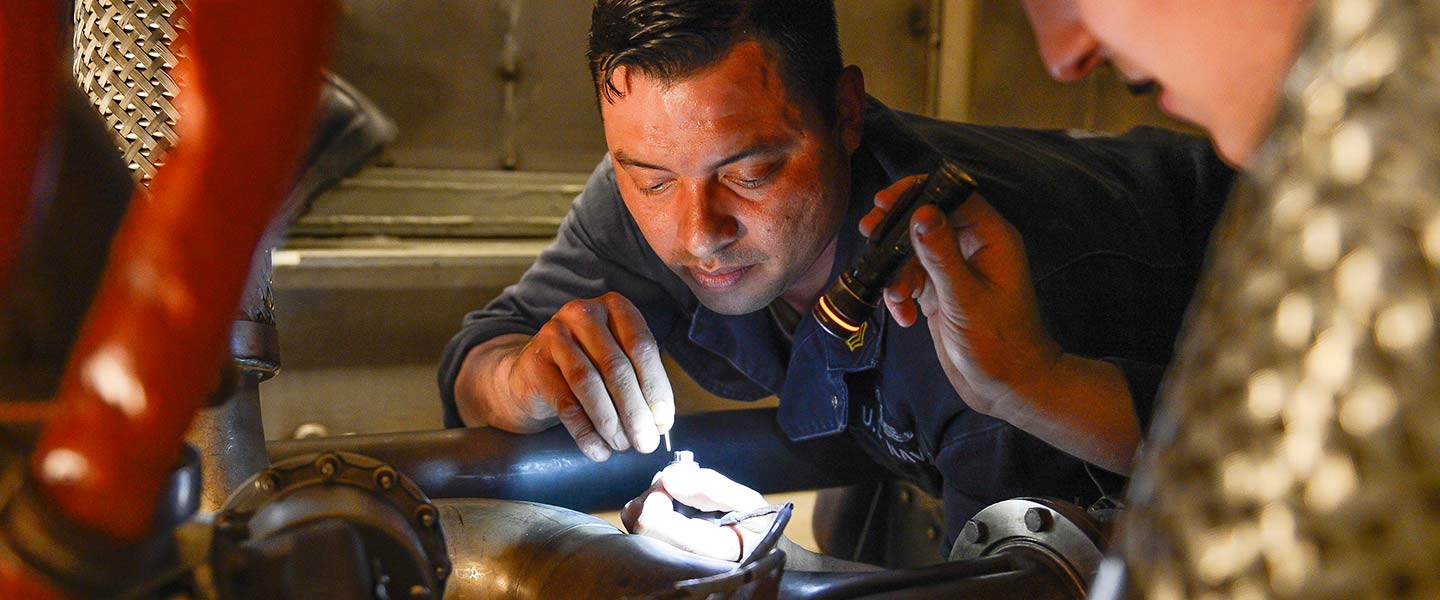What to Expect
More Information
Responsibilities
Gas Turbine Systems Technicians Electrical (GSE) operate and maintain the electrical components of gas turbine engines and propulsions systems. In this role, your responsibilities may include:
- Operating electric plant and propulsions control equipment
- Locating and repairing circuit failures
- Measuring current, voltage and resistance
- Testing and servicing circuitry, batteries and switches
- Performing preventive maintenance on digital data equipment and control and monitoring circuits
- Repairing electrical and electronic cables, wiring and connectors
- Maintaining alarm, indicator and warning systems
- Maintaining, testing and repairing gas turbine engines and auxiliary equipment
- Working with blueprints, schematics and charts
- Performing administrative tasks related to systems operation and maintenance
- Performing work area inspections
Work Environment
GSEs usually work in engine rooms or shops aboard many types of modern Naval ships. Working stations may be hot and noisy. When stationed on shore, GSEs may work at major repair or training facilities. In this job, you can expect a variety of physical demands.
Training & Advancement
Upon completion of initial training at Recruit Training Command Great Lakes (known as Boot Camp), you’ll report for specialized training, including:
Basic Engineering Common Core and “A” School (10 weeks) in Great Lakes, IL, for training on mechanical theory, piping systems and equipment, safety precautions and programs, use of tools and instruments, technical documentations and the Maintenance Material Management System (3M).
GSE Strand Technical School (16 weeks) in Great Lakes, IL, for specialized training on basic watch standing, piping systems and equipment, tools and instruments, technical documentation, the 3M system, gas turbine engine theory, propulsion theory, digital logic control systems, electromechanical and electrohydraulic devices, electrical power and distribution CPR, electrical math, basic schematics, circuitry and more.
After you complete your training, you may be assigned to fleet unit at sea or a shore station on land. The majority of your service will be spent on ships at sea.
Promotion opportunities are regularly available but competitive and based on performance.
Advanced Training
Advanced Training as a Gas Turbine Systems Technician may also be available during later stages of your career. For those with further leadership aspirations and a college degree, Officer roles may be available, providing opportunities to lead and train others.
Post-Service Opportunities
Specialized training received and work experience gained in the course of service can lead to valuable credentialing and occupational opportunities in related fields in the civilian world, such as employment as power plant operators, industrial machinery mechanics and more.
Education Opportunities
Beyond offering access to professional credentials and certifications, Navy technical and operational training as a Gas Turbine Systems Technician can translate to credit hours toward a bachelor’s or associate degree through the American Council on Education.
You may also continue your education through undergraduate degree opportunities like the Navy College Program and Tuition Assistance and the Post-9/11 GI Bill.
Qualifications & Requirements
A high-school diploma or equivalent is required to become an Enlisted Sailor and a Gas Turbine Systems Technician - Electrical. You must also be a U.S. citizen eligible for security clearance.
Applicants for the GSE rating should have mechanical ability, experience working with machines or electric/electronic systems, and have had some education in physics. Physically, you should have good use of your hands and normal color perception.
General qualifications may vary depending upon whether you’re currently serving, whether you’ve served before or whether you’ve never served before.
Part-Time Opportunities
Serving part-time as a Navy Reserve Sailor, your duties will be carried out during your scheduled drilling and training periods. During monthly drilling, Gas Turbine Systems Technicians in the Navy Reserve typically work at a location close to their homes.
For annual training, you may serve anywhere in the world, including locations in the U.S., at bases overseas, or in areas where humanitarian needs are great.
Take a moment to learn more about the general roles and responsibilities of Navy Reserve Sailors.
Most of what you do in the Navy Reserve is considered training. The basic Navy Reserve commitment involves training a minimum of one weekend a month (referred to as drilling) and two weeks a year (referred to as Annual Training) – or the equivalent of that.
Gas Turbine Systems Technicians in the Navy Reserve serve in an Enlisted role. Before receiving the ongoing professional training that comes with the job, initial training requirements must be met.
For current or former military Enlisted servicemembers, prior experience satisfies the initial Recruit Training requirement, so you will not need to go through Boot Camp again.
For those without prior military experience, you will need to meet the initial Recruit Training requirement by attending Boot Camp in Great Lakes, IL. This training course will prepare you for service in the Navy Reserve and count as your first Annual Training.

































































































































